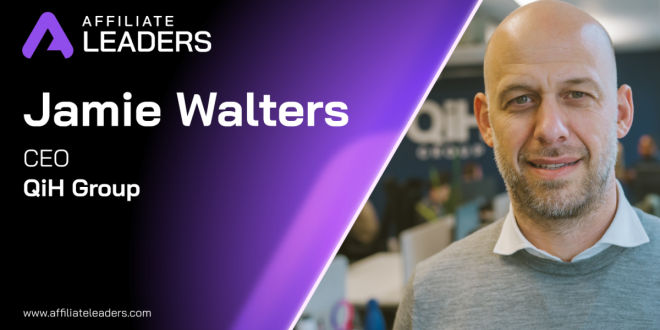The relationship between affiliates and operators is mutually beneficial and deeply commercial.
However, for QiH Group, the significance stretches far beyond mere commercial aspects and monetary gains linked to volume. Compliance and value stand resolutely as part of their core ‘internal mantra.’
For Jamie Walters, CEO and Co-Founder of QiH Group, prioritising people and cultivating long-lasting relationships with partners has been instrumental in helping the company grow and thrive in this competitive business.
Ahead of his appearance at the 2023 edition of SBC Summit Barcelona, Walters sat down with SBC Media to delve into the dos and don’ts of affiliation, the importance of staying true to a spirit of compliance, branching out into various facets of the industry, the business’s expansion into the US markets and its future plans, among other topics.
As one of the speakers at SBC Summit Barcelona, what are some crucial dos and don’ts in the realm of affiliation? Are there any key insights you can share that would help affiliates navigate the evolving landscape successfully?
One of my major priorities is to look after my people. Starting out as a bootstrapped affiliate 10 years ago, this is something I maybe didn’t think enough about in the company’s early days. However, as the company has grown, I have realised how crucial people are to a business. For this reason, we have made a real effort to create a strong culture at the company and we’re really proud of the fact that we have very high employee satisfaction levels. Our employees also tend to stay with our company longer than the industry average.
A second important aspect is to understand what your operator partners’ needs are and work hard to deliver them. One thing we have noticed is that operators in regulated markets are rightly concerned about compliance, so we work hard to not only meet their needs in this regard but exceed them.
One of our don’ts, which may be at odds with many other affiliates, is that we don’t work in unregulated markets. Although it may be perfectly legal to do so in many cases, we have chosen to operate only in markets where gambling has a licensing regime because we believe it makes our business more sustainable. It also makes it much easier to utilise legitimate digital marketing channels via companies such as Google and Meta.
Another one of our don’ts is not to push the boundaries when it comes to regulation. There are companies that will take a more liberal approach to, for example, advertising rules, and try to push things as far as they can. We don’t just stay within the letter of the law, but also the spirit of it. This is something we believe operators value, as they never have to worry that we are going to cause them any problems. This is especially important in the UK market, given that the industry is under intense scrutiny due to the Gambling Act review.
You founded QIH in 2014 – can you reflect on the growth of your affiliate business from its inception to its current status?
We have grown steadily since inception, with annual growth ranging between 50-100% since our start. The last year has been an exceptionally good one for us, with our revenues and EBITDA increasing by over 100%.
We have also signed a number of key partners over the past year and we now work with more than 125 brands in total. Each month we deliver over 10,000 new casino customers to our partners in the UK and the US.
This year, we have also received really valuable external recognition. We were shortlisted in the category of best acquisition and retention partner in EGR’s highly regarded B2B awards. Additionally, we made it onto the publication’s Power Affiliates list for the first time. We have our fingers crossed for similar success in SBC’s upcoming awards!
I attribute our continued success to our strong focus on relationships. Some of our partnerships – such as with Flutter, for example – go back to the company’s very early days and have grown and flourished thanks to our efforts aimed at working out exactly what operators need and delivering this for them.
With affiliates having the dual responsibility of satisfying the operators they collaborate with and catering to the consumers they serve, how do you effectively balance the needs of both parties while safeguarding your own business interests?
We don’t believe the requirements of operators and consumers are that different. Players want good value and service from operators and the latter are happy to provide this for loyal customers. Like our business, operators want long-term relationships with their customers and our business has always been aimed at providing sustainable players to our partners. We have never focused on the small minority of players who are high spenders as these often do not prove the best candidates for long-term relationships.
We are a very data-driven company and we work closely with our operators to exchange information so that we can tailor our approach depending on what is and isn’t working for that particular operator.
In the ever-evolving affiliate landscape, like some other affiliates, you have multiple strands to your business. Can you tell us why you’ve chosen to branch out from traditional affiliation and how you believe this decision benefits the business?
While we have primarily focused on affiliation, we also run a number of white-label casino sites, with an affiliate network called Tau Affiliates related to that. We also have a lead generation network called Offer Tonic, which generates leads and traffic for our affiliate sites. We believe being active in different areas of igaming gives us a better understanding of the entire ecosystem and that this gives us a competitive edge.
We have also recruited some key people from other parts of the igaming industry – from operators, for example – for the same reason.
Because the skill sets involved in the various parts of our business are in many cases the same, we are able to leverage several synergies, which ultimately enhance the overall performance of our business. Having different strands also improves our data even further.
As QiH expands its presence into the US market, could you provide insight into which states you are currently covering? Additionally, how do the opportunities and challenges in the US market differ from one another, as well as from your experience in the UK market, where you have established a strong presence over time?
So far, we have obtained licences in four US states: New Jersey, Pennsylvania, Colorado and Michigan. We are also in the process of registering to do business in New York, Nevada, Indiana, Ohio, Louisiana, Kansas and Iowa. There are slightly different opportunities in each market due to different regulations and tax rates. We have already seen some states prove to be unprofitable for operators and we keep a close eye on how each one is developing.
The obvious challenge is regulation. Unlike the UK, for many US states you have to obtain a licence to operate as an affiliate. I don’t necessarily see this as a bad thing. Yes, it takes time and money, but on the other hand, it creates a barrier to entry for other affiliates.
One thing the US offers that the UK doesn’t is the opportunity to gain a first-mover or early-mover advantage. The UK market is very mature and harder to break into for new affiliates. A lot of the big Tier 1 operators have either closed their affiliate programmes or made them difficult to enter for partners without significant scale and volume.
In the US, operators are very open to working with new affiliates and we see a real opportunity to prove our worth and develop long-term relationships, assuming the US market develops in the same way as that of the UK. The US market is growing, whereas the UK market is in more of a plateau stage.
One challenge that is probably a bigger hurdle than the regulatory issue is that customers in the US are not as educated about online gambling, which stands to reason given the number of years gambling was illegal in the country.
There is clearly a lot of interest from consumers and we get a lot of clicks, but the conversion to registration or first-time deposit is not at the same level as in the UK. So, part of our job as an early affiliate is to help customers navigate the industry and this is something we’re working on with our partners.
As you primarily focus on English-speaking markets, are there any emerging non-English-speaking markets that you are currently exploring or considering for future expansion?
We are considering a number of markets in Europe at the moment. The licensing regime in Sweden came in for a lot of criticism when it first launched, but a number of operators are flourishing there so that looks interesting. Similarly, while the regulated German market looks challenging for operators, it also presents opportunities given its size. Spain is also of interest given its size, although the advertising restrictions there present some challenges. We are also watching how the Dutch market develops; a number of established affiliates are pulling the plug there but that doesn’t mean there aren’t opportunities for us.
Given our early progress in the US, we’re also keeping a close eye on how the Canadian market develops as the fact it is an English-speaking country means it would be relatively easy for us to enter.
Latin America is also interesting and moves towards regulation in big markets such as Brazil are something we are paying very close attention to.
Any markets we enter will be dependent on regulation, as we plan to continue to focus on regulated markets going forward.
What key learnings do you want delegates to take away from your panel?
There are loads of opportunities for operators and affiliates to work together if the goals of both parties are aligned. As the UK market has undergone some changes from a marketing and advertising perspective, this creates even more opportunities for operators to leverage the affiliate marketing channel.
Affiliates must remember that the affiliate/operator partnership is a commercial relationship. Operator partners want value that exceeds the price they are paying in terms of customers and volume. Otherwise, it is not worth their while. It is important to understand your partners’ objectives from the outset if you want to build long-term relationships rather than just go for quick wins.
For QiH, ‘Compliance, Value and Volume’ is our internal mantra when it comes to our operator partners.
Jamie Walters will be speaking on the ‘The dos and don’ts of affiliation’ panel, which is part of the ‘Affiliate Focus’ conference track at SBC Summit Barcelona. The panel is scheduled for 20 September, from 14:00-14:40. Walters will be joined by Adam Bielinski (CEO and Co-Owner, iGamingNuts), Tom Galanis (CEO, TAG Media), Priscila Pio (Head of affiliates, BETANDEAL) and panel moderator Rafael Costa (Acquisition Marketing Manager, NOK Services (Rivalo)).









